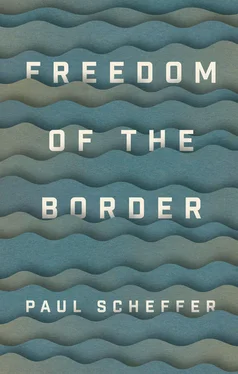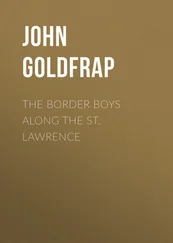Here I have taken the original text of that essay as my starting point. I’ve expanded the original chapters and added six more. In various places I’ve freely made use of earlier publications and lectures. More specifically, I’ve used the Pacification Lecture that I gave in Ghent in 2012 and a lecture at the University of Tilburg from 2014. I’ve also drawn upon my contribution to a book about the shooting down of flight MH17.
The issue of borders is to the fore, so the essay form is no accidental choice. The genre lends itself beautifully to the crossing of borders. Overcoming the division of labour between disciplines, which José Ortega y Gasset once called ‘the barbarism of specialization’, is essential if you want to say anything useful about dealing with borders. Without specialists, generalists are powerless, so here too we have to take dividing lines seriously. Furthermore, such an undertaking is of course risky, since nobody can encompass such diverse disciplines, but a broad view remains necessary if we are to find a direction in a chaotic world.
I am grateful to John Thompson and Elise Heslinga of Polity for their willingness to publish another book of mine, after Immigrant Nations . And I would like to thank Liz Waters, who translated this book with great care and patience. She also translated my previous book with Polity and the cooperation proved to be, once more, a real pleasure.
1 1 Paul Scheffer, De grenzen van Europa, Brussels, Academia Press, 2012.
2 2 Paul Scheffer, ‘De gewelddadige randen van het continent: Europa tussen macht en moraal’, in Gabriël van den Brink (ed.), Een ramp die Nederland veranderde? Nadenken over vlucht MH17, Amsterdam, Boom, 2015, pp. 29–57.
3 3 See José Ortega y Gasset, The Revolt of the Masses, transl. Anon., New York, W. W. Norton, 1932, ch. XII, pp. 107ff. (originally published as La rebelión de las masas, 1930).
Introduction: Exploring boundaries
I was eighteen when I first stood at the Wall that cut Berlin in two. In the summer of 1973, as one of my country’s representatives at the World Festival of Youth and Students, I saw at first hand the ghostly tableau of the East German side. We were housed at the edge of the city and from my window I could see the watchtowers and searchlights at the Wall a short distance away. Its official name was the Antifaschistischer Schutzwall, the Antifascist Protection Rampart, but in reality it had been built to prevent East German citizens from leaving.
One Sunday morning sixteen years later I watched as an excavator removed its first segment of the Wall at the Potsdamer Platz, three days after that historic 9 November 1989 when the Wall fell. 1A huge crowd thronged the square. I leaned on the shoulder of a smiling border guard to get a better view. For twenty-eight years this former traffic intersection at the heart of the city had been an impassable barrier. Now no-man’s-land was filling up with a cheerful multitude, and together we experienced the beginnings of a new vision of the old continent.
I well remember the sense of relief in the years that followed the end of the Cold War. At last we were rid of the Iron Curtain that had divided Europe so brutally. The oppression of the Eastern part of the continent was over and the ‘peace dividend’ was quickly cashed in. Major cuts to defence expenditure became possible, with worries about territorial integrity and border security resolved. After 1989 everything was going to be different.
Now, more than thirty years later, we again find ourselves talking endlessly about borders. The influx of refugees provokes emotional responses. There is apparent agreement about the need to improve the security of Europe’s external borders, but still no sign of a real determination to act. In fact European division on this point is greater than ever, partly as a result of moral diffidence: on what grounds can we deny others the right to settle in our part of the world?
This book is about the open society and its borders. I’ve always been suspicious of the notion that we live in a borderless world. It’s a self-image that betokens a rather inward-looking attitude. Because what is left to be discovered if there’s no outside world? The value of crossing borders can be understood only by those willing to acknowledge their significance.
My approach to the issue has been shaped in part by the history of my own family. One of my grandfathers, Herman Wolf, was born in Cologne; the other, Lou Scheffer, in Batavia in the Dutch East Indies. It was made clear to me at a very early age that the world is bigger than the country into which I was born. I grew up in a liberal environment in which the novels of Jean-Paul Sartre and Heinrich Böll were venerated (a minor rapprochement between the French and the Germans), while at the same time the jazz of Nina Simone and Stan Getz was embraced (a minor rapprochement between black and white).
Along with curiosity, I inherited anxiety, which manifested itself from an early age. While clearing my mother’s flat after she died, I came upon my father’s wartime arrest warrant and a couple of letters he had written to his parents from the prison camp in Amersfoort. The war was never a subject of conversation between us at home, since my parents didn’t want to see their children burdened by it. All the same, that period in history was a looming presence, all the more so because it was unthinkable that any of us would ever mention it.
For me the border is first of all a childhood memory. There was one border we were never allowed to cross, between the Netherlands and Germany. My mother refused to step beyond it until well into the 1970s, which was strange, because we lived quite close by, in Arnhem. Her refusal was a gesture of respect for her Jewish father, Herman Wolf, who moved to Amsterdam with his parents around the turn of the twentieth century. 2We were not allowed past the border that, many years before, he had crossed in the opposite direction along with his parents.
His life and work in Amsterdam in the 1930s were those of a literary generation, enthusiastic about humanism but at the same time filled with a deep pessimism. Influenced philosophically by Schopenhauer and Nietzsche, yet also marked by the First World War, they were at the start of a century now sometimes described as an age of extremes. Wolf witnessed the rise of totalitarian movements and his opposition to them led him to ask questions about the resilience of humanism.
Shortly after Adolf Hitler’s seizure of power, Herman Wolf wrote, ‘That is the problematic, indeed tragic situation of the humanist in our time. He is profoundly convinced that faith in the value solely of race, people and party will lead to the most atrocious violation of all that is purely and truly human.’ What puts the humanist thinker in such a tragic position? ‘He cannot articulate his conviction by means of concrete forms and symbols; again and again he can only watch as others, by appealing to blood, race, folk, church and party, gain millions of followers.’
This is a significant problem in our own day too. We are experiencing once again a clash between openness towards the world and the urge to preserve a specific heritage. The question that has preoccupied me for years is this: are we forced to conclude that identification with a specific people and identification with humanity as a whole are irreconcilable, or is it possible to bridge the gulf between the two?
Today, despite living in a very different time, we realize how hard it is to give shape to a humanism that is robust and that rises above an appeal to our own distinctiveness. I understand humanism to mean making the case for humanity in general, resisting the idea that cultural otherness cannot be overcome. It is a dilemma of Herman Wolf’s time and of our own, and it is the subject of this book.
Читать дальше












